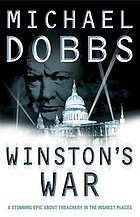Winston's War
Winston's War is a 2003 novel by Michael Dobbs that presents a fictional account of the struggle of Winston Churchill to combat the appeasement policies of Prime Minister Neville Chamberlain.[5][6][7]
 First edition HarperCollins cover art | |
| Author | Michael Dobbs[1] |
|---|---|
| Country | United Kingdom |
| Language | English |
| Series | Churchill |
| Genre | Historical novel |
| Publisher | HarperCollins |
Publication date | 2002 |
| Media type | Print (hardback and paperback)[2] |
| Pages | 487 |
| ISBN | 0-00-713018-X [3] |
| OCLC | 48885056 |
| 823/.914 22 | |
| LC Class | PR6054.O23 W56 2002 |
| Followed by | Never Surrender[4] |
Plot summary
The story starts with Chamberlain's 1938 triumphant return to 10 Downing Street, a public hero after the signing of the Munich Agreement with Adolf Hitler, declaring "peace in our time." The story ends with the fall of the Chamberlain Government, and the appointment of Churchill as Prime Minister.[8]
Churchill, relegated to the periphery of British politics by the late 1930s, lashes out against appeasement despite having almost no support from fellow parliamentarians or the British press. The novel includes many of the momentous historical personages of the day: Chamberlain, the ailing and pacifist Prime Minister; Churchill, the political outcast, whose pugnacity created opprobrium in the public eye; Joseph Kennedy, the U.S. Ambassador to the Court of St. James's; Guy Burgess, an alcoholic BBC journalist of later Cold War infamy; the machiavellian newspaper mogul Max Aitken (Lord Beaverbrook), and the stuttering and insecure King George VI, who personally detests Churchill and tries to persuade his good friend, Lord Halifax, to take the reins of leadership.
Winston's War is the first in a series of novels by Dobbs about Churchill's wartime leadership. The sequel Never Surrender continues the storyline over the first few weeks of Churchill's premiership.[9][10]
References
- "Book Chart". Express and Echo. 17 October 2013.
- "London's Best Sellers". The Evening Standard (London). 6 December 2004.
- "Winston's War". OCLC Worldcat. Retrieved 12 April 2014.
- "Churchill's Hour". Derby Evening Telegraph. 24 June 2005.
- Pearce, Robert (September 2004). "Winston's War". History Review (49): 33–35.
- Tebbit, Norman (20 November 2009). "My Six Best Books". The Express.
- Robinson, David (19 November 2005). "A Bulldog in Chains". The Scotsman.
- "Michael Dobbs: Churchill's Hour". The New Zealand Herald. 8 February 2005.
- "Paperbacks". Courier Mail. 31 December 2005.
- Hill, Alan (10 December 2005). "Real Triumph was Triumph of the Spirit". Daily Telegraph (Sydney, Australia).